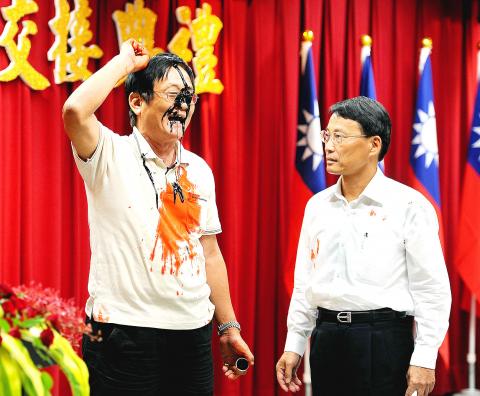OIL
CPC greenlights boss pick
State-run oil refiner CPC Corp, Taiwan’s (CPC, 中油) board of directors yesterday approved a proposal to tap China American Petrochemical Co Ltd (CAPCO, 中美和石油) president Paul Chen (陳綠蔚) to replace CPC president Arthur Kung (孔祥雲). Chen worked in CPC management for 30 years before joining CAPCO in January last year. He said he plans to maintain current policies to improve CPC’s business. Chen said he planned to increase CPC’s oil and natural gas exploration projects as the company needs to grow its oil and natural gas outputs by up to 10 percent a year to reduce reliance on imports and trim losses. As of Aug. 31, CPC’s accumulated losses were NT$71.3 billion (US$2.41 billion), company data showed.

Photo: Fang Pin-chao, Taipei Times
ENERGY
Formosa refinery still limited
Formosa Petrochemical Corp (台塑石化) yesterday said it plans to maintain the operating rate of its Mailiao refinery in Yunlin County at about three-quarters of capacity after it restarted a unit that reduces sulfur from fuels. The nation’s only publicly traded oil refiner restarted a residual desulfurizer at the 540,000 barrel-a-day plant on Sunday and a crude distillation unit on Sept. 10, company spokesman Lin Keh-yen (林克彥) said. The refinery’s crude processing has risen to 400,000 barrels a day this week, from 300,000 barrels last week, Lin said by telephone. Formosa is in “no hurry” to boost throughput as it has sufficient stockpiles of middle distillates, he added.

SEEKING CLARITY: Washington should not adopt measures that create uncertainties for ‘existing semiconductor investments,’ TSMC said referring to its US$165 billion in the US Taiwan Semiconductor Manufacturing Co (TSMC, 台積電) told the US that any future tariffs on Taiwanese semiconductors could reduce demand for chips and derail its pledge to increase its investment in Arizona. “New import restrictions could jeopardize current US leadership in the competitive technology industry and create uncertainties for many committed semiconductor capital projects in the US, including TSMC Arizona’s significant investment plan in Phoenix,” the chipmaker wrote in a letter to the US Department of Commerce. TSMC issued the warning in response to a solicitation for comments by the department on a possible tariff on semiconductor imports by US President Donald Trump’s

The government has launched a three-pronged strategy to attract local and international talent, aiming to position Taiwan as a new global hub following Nvidia Corp’s announcement that it has chosen Taipei as the site of its Taiwan headquarters. Nvidia cofounder and CEO Jensen Huang (黃仁勳) on Monday last week announced during his keynote speech at the Computex trade show in Taipei that the Nvidia Constellation, the company’s planned Taiwan headquarters, would be located in the Beitou-Shilin Technology Park (北投士林科技園區) in Taipei. Huang’s decision to establish a base in Taiwan is “primarily due to Taiwan’s talent pool and its strength in the semiconductor

An earnings report from semiconductor giant and artificial intelligence (AI) bellwether Nvidia Corp takes center stage for Wall Street this week, as stocks hit a speed bump of worries over US federal deficits driving up Treasury yields. US equities pulled back last week after a torrid rally, as investors turned their attention to tax and spending legislation poised to swell the US government’s US$36 trillion in debt. Long-dated US Treasury yields rose amid the fiscal worries, with the 30-year yield topping 5 percent and hitting its highest level since late 2023. Stocks were dealt another blow on Friday when US President Donald

UNCERTAINTY: Investors remain worried that trade negotiations with Washington could go poorly, given Trump’s inconsistency on tariffs in his second term, experts said The consumer confidence index this month fell for a ninth consecutive month to its lowest level in 13 months, as global trade uncertainties and tariff risks cloud Taiwan’s economic outlook, a survey released yesterday by National Central University found. The biggest decline came from the timing for stock investments, which plunged 11.82 points to 26.82, underscoring bleak investor confidence, it said. “Although the TAIEX reclaimed the 21,000-point mark after the US and China agreed to bury the hatchet for 90 days, investors remain worried that the situation would turn sour later,” said Dachrahn Wu (吳大任), director of the university’s Research Center for